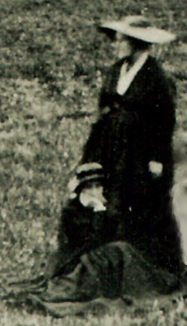|
Having helped to "emancipate the slave," Abigail May Alcott wrote after the Civil War, women must "work out their own emancipation." In 1875, when she penned those words in a petition for female suffrage, Abigail had been active for forty-five years in the movements to abolish slavery and to allow women to vote. She knew that she, at seventy-four, would not live to vote, but her adult daughters might. None of her daughters survived long enough to see it, but in 1920, with the Nineteenth Amendment, women did work out their own emancipation, as Abigail May Alcott had hoped.
0 Comments
Just returned from a photo shoot with photographer Alex Gagne, who freelances for The Boston Globe, at Louisa May Alcott's Orchard House, in Concord. Alex's photo will appear in the Boston Sunday Globe Magazine on November 4 alongside an interview by Patricia Harris and David Lyons.
 Eve with Jeremy Sewall Chef Jeremy Sewall - of Island Creek Oysters, Lineage, and Eastern Standard fame - and I were invited to WBUR and the New Enland Historical and Genealogical Society to talk about food and our ancestor Samuel Sewall, the Salem witch judge. Delicious! To hear some of our conversation about this remarkable judge, Samuel Sewall, whose portrait hangs in Abigail May Alcott's bedroom at Orchard House in Concord, Massachusetts, please click: http://radioboston.wbur.org/2012/10/17/judge-samuel-sewall  It's incredible that Abigail May Alcott has so long been ignored. The papers of her husband and daughter Louisa have been in print for generations, while her journals and letters are being published only now. The conventional wisdom was that Abigail’s papers were all burned, as Louisa claimed. Louisa made the same claim about her own private papers, though, and that did not deter scholars from finding and publishing hundreds of pages of Louisa’s surviving letters and journals. In the case of Abigail, her papers were neglected and her importance was obscured. Could it be that as readers of Little Women we felt we already knew the character of Louisa’s real “Marmee”? A larger phenomenon may be at work here. Women, long excluded from American public life, have largely been neglected in American history. Think how few female figures in American history were not (at least first) the wives of famous men. In early America a woman was expected to be silent in church and all other public spaces. Her proper realm was private; if she held public power she was seen as a threat to society. Women who challenged this established order were hanged as witches or banished as heretics. This, too, may explain why Abigail May Alcott’s writings have so long been hiding in plain sight -- a few in attic trunks and rural farmhouses, but most of them in university and archival collections.  Louisa and Abigail May Alcott, c. 1865 What I learned about Abigail May Alcott while researching Marmee & Louisa and My Heart Is Boundless has changed how I read Louisa's work and understand Louisa's life. Not only did Abigail encourage Louisa to write from an early age, but also she provided material for Louisa’s fiction. Abigail encouraged her daughter to read her private journals, which contained detailed descriptions of Abigail’s marital troubles, frustrations, and dreams. As the young author pored over voluminous descriptions of her mother’s inner life, she was composing adult novels and sensational stories about violent relationships, abusive marriages, and suicidal women struggling for equality with men. Abigail’s happy childhood, tragic marriage, and aborted career became fodder for Louisa’s vivid imagination. In Little Women and her other juvenile novels, Louisa concealed the messy, painful realities of her own childhood – poverty, marital strife, and an absent father – by incorporating into her fiction aspects of her mother’s early life. In her works for adults, in contrast, Louisa exploited the difficult truths of her own and her mother’s experiences as girls and women. |
AuthorEve is the author of Who Needs A Statue?, Seized, American Jezebel, Marmee & Louisa, and Salem Witch Judge. Archives
July 2024
Categories
All
|

 RSS Feed
RSS Feed